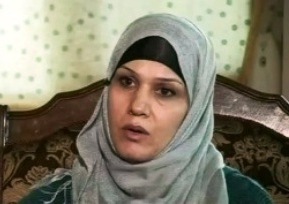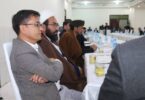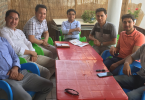Waheeda Mohaqiq, the third wife of Mohammad Mohaqiq – one of the senior members of National Coalition, the most prominent opposition in Afghanistan – broke a 12-year-old Afghan taboo. Over the past twelve years, the wives of prominent political leaders in Afghanistan have hardly ever appeared before media, nonetheless, On March 8, Mrs. Mohaqiq, in addition to interviewing with BBC-Persian TV channel said she had decided to begin playing an active role in Afghanistan’s politics.
Thanks to a relatively democratic political atmosphere in the past twelve years, a significant number of Afghan women have become involved in Afghan politics. However, female family members, particularly wives of prominent Afghan political leaders have almost had no chance to get involved in politics and to help Afghan women find a way forward from political and social chaos. In fact, the wives of Afghan political leaders have been like obedient ‘housewives’ besieged behind the walls of their husbands’ palaces.
Even Mrs. Zinat Karzai, the First Lady of Afghanistan has rarely participated in political and social events and has hardly ever appeared before media. Within the past twelve years, except a few photos and an interview which Mrs. Karzai had with BBC-Persian radio on March 07, 2013, no video or sound has ever been broadcast from her.
BBC officials in Kabul said that after several requests, Mrs. Karzai showed her readiness for an interview but had a condition for it – which was no filming!
Mrs. Karzai has said that Afghan society is not yet ready for her appearance before media and it is not the right time for her to play an active role in the Afghan society, whereas currently, nearly 100 members of Afghan National Assembly are women, several Afghan government ministries are controlled by women, the head of Afghanistan Independent Human Rights Commission is a woman and one woman is a governor.
Even Mrs. Zinat Karzai, the First Lady of Afghanistan has rarely participated in political and social events and has hardly ever appeared before media. Within the past twelve years, except a few photos and an interview which Mrs. Karzai had with BBC-Persian radio on March 07, 2013, no video or sound has ever been broadcast from her.
Over the past decade, Afghan government has celebrated the International Women’s Day every year and President Hamid Karzai has participated in almost all ceremonies that have been organized in commemoration of this day, though his wife has never been seen in almost any of this events. In fact, Afghanistan’s First Lady has never been seen in any major public event over the past twelve years.
Also, in the past four elections that took place in Afghanistan over the past decade, Mrs. Karzai was never seen accompanying her husband while casting her vote.
Nonetheless, some opposition leaders’ wives have been seen in some public events a very few times.
The wife of Dr. Abdullah Abdullah – Karzai’s major contender in 2009 presidential election – was the only prominent woman who accompanied her husband while casting her vote. However, her appearance was considered symbolic and was not widely covered by Afghan media. In fact, she did not make any speech and journalists had no chance to ask her questions.
In the past twelve years, the only prominent woman whose appearance in political scenes can be considered relatively significant was Zahera Rabbani, the late Burhanuddin Rabbani’s – the former head of Afghan High Peace Council and former President of Afghanistan – wife. In late 2011, she addressed journalists in a press conference in Balkh Province and pledged to take part in programs of a women’s council. She also raised her concerns about peace talks with the Taliban because she believed it would probably result in failure.
Nevertheless, Mohqiq’s support for the appearance of his wife, Mrs. Waheeda Moqiaq, a Bachelor’s degree holder from Balkh University on a television show of BBC, is promising. In fact this could be a step towards changing of traditional beliefs about women and breaking of Afghan taboos.
In the press conference, Mrs. Rabbani admitted that she was not active in politics as she passed most of her time at home, doing household chores. Nevertheless, her public appearance as the wife of one of the most well-known and influential political leaders of Afghanistan was a milestone in the lives of Afghan leaders’ wives.
Mrs. Mohaqiq and Mrs. Rabbani’s appearance before media has been unprecedented in Afghanistan. However, in a lower level, the wives of a few Afghan leaders have been relatively active in Afghan society for many years.
Fatana Gillani, wife of Eshaq Gillani, a Member of Parliament and Fatima Gillani, wife of Anwarulhaq Ahadi, the Afghan minister of commerce have played a relatively active role in Afghan society in the past two decades. However, these two women have been influenced mainly by their father Ahmad Gillani, a moderate well-known Afghan Mujahedin leader, not by their husbands.
In fact, thanks to their well-known father, Mrs. Fatana, the current head of Afghan Women Society and Mrs. Fatima who is the head of Afghan Red Cross Organization have been more famous than their husbands.
The fall of Taliban – the regime which was famous for suppressing women – and formation of a constitution which ensures equality between Afghan men and women provided a number of significant grounds for Afghan women to play a role in the country’s politics. Under the current political system, the general public expected their leaders, particularly the President, the Vice Presidents, the Ministers and other high ranking officials to take the first steps for implementing the provisions of the Constitution with respect to women’s rights. However in practice, instead of political leaders, a number of ordinary Afghan men showed more commitment to provisions of the Constitution and provided their wives with better grounds to play political roles. In current-day Afghanistan, the wives of many ordinary Afghan men enjoy more political, cultural, economic and social freedom than the wives of Afghan leaders.
Women’s rights advocates and human rights activists are suspicious
Such a treatment of women by well-known Afghan leaders has made women’s rights advocates and human rights activists suspicious about the real intentions of Afghan leaders with respect to women’s rights and freedom. Afghan leaders’ behavior towards their own wives has made women’s rights advocates pessimistic and concerned. A big part of this concern stem from the fact that most Afghan leaders do not allow their wives to get involved in social and political activities and have actually besieged their wives behind the walls of their houses.
How has it been possible for Mrs. Mohaqiq to break a 12-year-old deadlock in Afghanistan? The answer for this question can be inferred from Mr. Mohqiq’s explanations.
Nevertheless, Mohqiq’s support for the appearance of his wife, Mrs. Waheeda Moqiaq, a Bachelor’s degree holder from Balkh University on a television show of BBC, is promising. In fact this could be a step towards changing of traditional beliefs about women and breaking of Afghan taboos.
The international community has played a key role in improvement of civil rights in Afghanistan
How has it been possible for Mrs. Mohaqiq to break a 12-year-old deadlock in Afghanistan? The answer for this question can be inferred from Mr. Mohqiq’s explanations. In response to a question of BBC’s correspondent, Mohaqiq admitted that presence and efforts of international community in Afghanistan was the most significant factor which encouraged Afghan women to appear in public life and these efforts has influenced him and his wife as well.
We can infer From Mohaqiq’s explanations that political and social atmosphere has significantly changed in Afghanistan over the past twelve years. In fact, nowadays, in many parts of Afghanistan, it is relatively difficult for Afghan men to besiege their wives inside their houses and prevent them from playing political and social roles. So Afghan political leaders should also release their wives from house arrest and should respect their civil rights.










Leave a Comment